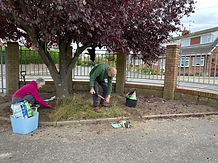




Gage Road Chapel Eco Church News

Gage Road Chapel
Our Eco Church News
Achieving Our Eco Church Award
Gage Road Chapel has achieved the A Rocha Eco Church Silver Award.
Becoming an Eco Church is more than just making our buildings eco-friendly. It’s a whole journey that touches every part of our Chapel.
It’s all about living in harmony with nature asFellowship, and making sure our actions speak louder than our words.
It’s about connecting with our community and encouraging them to become more environmentally friendly. By setting a positive example, we can show them that it’s the right thing to do.








What is ECO Church @ A Rocha?
By Janetta Freeman, Eco Group Leader Gage Road Chapel
A Rocha - Is an international network of organisations with a Christian ethos. A Rocha means ‘the rock’ in Portuguese. It was founded in 1983 in Portugal. As of 2024 A Rocha is working in over 20 countries across the world. It has five core commitments: Christian, conservation, community, collaboration and cultural diversity.
A Rocha aims to protect the environment through local, community based conservation, scientific research and environmental education.
ECO Church - Is an A Roca UK project, run in partnership with Christian Aid, The Church of England, The Methodist Church, Tearfund, The United Reform Church and All Churches Trust Ltd. The program equips churches in England and Wales to better care for creation.
ECO Church - On a local level in Sprowston - In September 2024, Tim Yau, Rural Dean and Interim Associate Priest based at St Cuthbert’s Church, ran a four-week course called Tenants of the King. The course was based on a series of small group studies designed to inspire hope and action for God’s creation.
It’s goal was to Invite local churches to come together to explore God’s purpose for creation, environmental brokenness, and hope and Christian environmental advocacy. As it was well received it led to a number of attendees forming the Sprowston Churches ECO Group.
The vision for the group is twofold:
1. Supporting one another in making our churches more eco-friendly.
2. Collaborating with our local community to encourage sustainable environmental practices.
The first meeting of the Group was set up to discuss its vision and goals, and to assess current church eco initiatives alongside new ideas. The Group is still very much in its infancy, but the more we talk the more the ideas flow. Of course, much depends on what is realistically achievable or not i.e. available resources, land, and location.
An example of an early initiative that fits with the ethos of Eco Church has taken place at the Methodist Church, Wroxham Road, who, having enough outside space, have created an outside community area with seating, planting, and produce.
Another example took place in 2021 at All Saints Church, Horsford, where they made a decision to take a more proactive role in protecting the environment. As part of this initiative they signed up for the A Rocha Eco Church Awards. They have now achieved their Bronze Award. Here are a few examples of what they have done: they've started using Fair Trade tea, coffee and sugar; they've built a bug-church to encourage local wildlife and increase bio-diversity; they've engaged in toilet twinning; and began talking about the importance of conservation during worship services.
Tim shared this with me, ’Locally, our Eco Church journey is being shaped by a desire to integrate environmental responsibility into the life of our churches and to inspire our wider community towards sustainable living. Our work towards the Eco-Church Award has been a significant step in this, involving the formation of a small team, including Liz Graveling, to develop an agreed environmental policy. One of our key projects has been researching an eco-friendly heating system for St Cuthbert’s Church, working closely with the diocese and exploring potential grants. Our next goal is looking into the feasibility of installing solar panels.’
God our Creator set out clear instructions for all of mankind, right at the very beginning of scripture, to be caretakers of His earth and everything in it, rather than using it as a resource to be exploited. Use it - not misuse it!
In Hosea Chapter 4 verses 1-3, it speaks of Israel’s sin, stating it is ‘why the land is in mourning, everyone is wasting away, even the wild animals, birds of the sky and the fish are disappearing’.
There are leaders in the world who live in ‘environmental denial’, nurturing their own selfish desires and ambitions and hoodwinking those who will listen to them along the way to go agree with them.
We are living through a time of climate crisis and nature is struggling. Why - often through a lack of interest and support from decision makers.
Yet, there is hope for a better future if we all play even a small part individually, and as a Christian church we take action and lead by example.